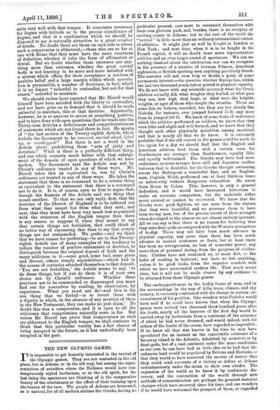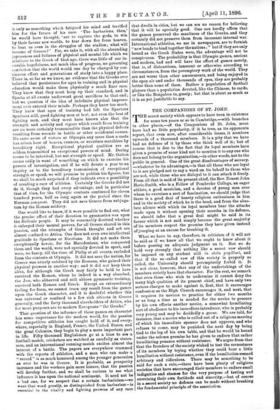THE NEW OLYMPIC GAMES.
IT isiniPmsible to get honestly interested in the revival of the Olympic games. They are not contested in the old place, but in Athens, or in the old way, but among the repre- sentatives of outsiders whom the Hellenes would have con- temptuously styled barbarians, or in the old spirit, for the last thing the spectators are thinking of is the comparative beauty of the combatants or the effect of their training upon the beauty of the race. The people of Athens are interested, as is natural, for of all modern nations the Greeks, having no particular present, care most to reconnect themselves with their own glorious past, and, besides, there is no overplus of exciting events in Athens; but to the rest of the world the " revival " is little more than an ordinary international contest of athletics. It might just as well be fought in London or New York ; and next time, when it is to be fought in the French capital, it will no doubt draw more representative athletes and an even larger crowd of spectators. We can see nothing classical about the celebration, nor can we recognise in the presence of a number of German Princes, American sightseers, or British sporting men anything peculiarly Greek. The contests will not even help to decide a point of some permanent interest,—the question whether Europe has, within the last two thousand years, lost or gained in physical capacity. We do not know with any scientific accuracy what the Greek athletes actually did, what weights they hurled, at what pace they ran, how high they leapt, or what were the heights, weights, or ages of those who sought the wreaths. There are some lies, we believe, recorded, bat they are too clearly lies. Nobody, for instance, ever jumped forward 55 ft. any more than he jumped 500 ft. We know of some feats of endurance which the athletes performed as soldiers, we know that they were lithe and slight and well, formed, and we know that they thought each other physically matchless among mankind, and that is nearly all that we do know. It is extremely probable that if the old victors in the games could be made to live again for a day we should find that the English and American athletes beat them with a certain ease, for Northerners are stronger than Southerners, equally lithe and equally well-trained. The Greeks may have had more endurance, as some savages have still and Japanese coolies, but even that is doubtful, for the Greeks thought swimming across the Hellespont a wonderful feat, and an English- man, Captain Webb, performed one at least thirteen times as noteworthy without dangerous exhaustion. He swam from Dover to Calais. This, however, is only a general deduction, and it would have interested historians to make an accurate comparison, but the materials either never existed or cannot be recovered. We know that the Greeks were good fighters, we are sure from the statues that they were beautiful, and we presume them to have been strong men, but of the precise extent of their strength when developed to the utmost we are almost entirely ignorant. All we can say is that there is no reason for believing that they were demi-gods as compared with the Western youngsters of to-day. There may not have been much advance in physical capacity, any more than there has been much advance in mental acuteness or force, but at least there has been no retrogression, no loss of muscular power, any more than of personal daring, from the progress of civilisa- tion. Clothes have not weakened us, or meat diet, or the habit of reading in boyhood; nor have we lost anything, unless it be good looks, from the superior comfort with which we have surrounded modern life. That much seems clear, but it mill not be made clearer by any evidence to be obtained from these Olympic games.
The unchangeableness in the bodily frame of man, and in his surroundings in the way of hills, trees, climate, and sky scenery, is curiously contrasted with the change in certain cir- cumstances of his position. One wonders what Pericles would have said if he could have known that when the Olympic games were revived two thousand three hundred years after his death, nearly all the honours of the first day would be carried away by barbarians from a continent of the existence of which he had never dreamed, and would indeed, with his notion of the limits of the ocean, have regarded as impossible. If he knew all that was known in his time he may have speculated for an instant on the conceivable existence of a far-away island in the Atlantic, inhabited by monsters or by demi-gods, but of a vast continent under the same conditions as our own he can have had as little idea as he had that the unknown land would be populated by Britons and Iberians, or that they would so have mastered the secrets of nature that they could send accounts of a victory or defeat at Athens instantaneously under the ocean to their own abodes. The expansion of the world as he knew it by continuous dis- covery, and the contraction of the world through new methods of communication are perhaps the greatest material changes which have occurred since his time, and one wonders if he would have welcomed the prospect of them, or regarded
it only as something which fatigued his mind and terrified him for the future of his race. 'The barbarians, then,' he would have thought, are to capture the gods, to win
by their favour new worlds, to tear down fire from heaven,
to beat us even in the struggles of the stadion; what will become of Greece ? ' For, we take it, with all the abounding
joyousness and fullness of physical and mental life which we attribute to the Greek of that age, there was little of our in- curable hopefulness, not much idea of progress, no governing conviction that the world would one day be changed by con-
tinuous effort and generations of study into a happy place. There is, so far as we know, no evidence that the Greeks ever believed that persistence for ages in training and in physical education would make them physically a much finer race. They knew that they must keep up their standard, and in Sparta at all events underwent great sacrifices to that end ; but we question if the idea of indefinite physical improve- ment ever entered their minds. Perhaps they knew too much. They knew that ages of training had left the Spartans Spartans still, good fighting men at best, not even the best of fighting men, and they must have known also that the strength and activity and vigour which result from training are no more certainly transmissible than the physical defects resulting from wounds in battle or other accidental causes. No caste arose of victors at Olympia any more than a caste has arisen here of boxers, runners, or wrestlers matchless by hereditary right. Exceptional physical qualities are as seldom transmitted as exceptional powers of mind. Daring seems to be inherited, but not strength or speed. Mr. Galton seems sadly in want of something on which to exercise his powers of investigation, and if he will devote a year to an inquiry as to the hereditary transmission of exceptional strength or speed, we will promise to publish his figures, but we shall be much surprised if they indicate even a possibility of creating a race of athletes. Certainly the Greeks did not do it, though they had every advantage, and in particular that of time, for the Olympic contests continued for eleven hundred years, half as long again as the period since the Norman conquest. They did not save Greece from subjuga- tion by the Roman soldiery.
One would like to know, if it were possible to find out, what the precise effect of their devotion to gymnastics was upon the Hellenic people. It may be reasonably doubted whether it enlarged their mental powers, for all Greece shared in this passion, and the triumphs of Greek thought and art are almost confined to Attica. One does not even owe intellectual gratitude to Spartans or Bceotians. It did not make them exceptionally heroic, for the Macedonians, who conquered them and the world, were not specially devoted to sport, and were, we fancy, till the time of Philip at all events, excluded from the contests at Olympia. It did not save the nation, for Greece was utterly subdued by the Romans, who gained their physical prowess in another way ; and it did not keep them alive, for although the Greek may fairly be held to have survived the Roman, whom he indeed in a way absorbed, the Jew, who abhorred and still abhors gymnastic training, survived both Roman and Greek. Except an extraordinary feeling for form, we cannot trace any result from the games upon the Greek character, and it is doubtful whether this was universal or confined to a few rich citizens in Greece generally, and the forty thousand slaveholders of Attica, who for most purposes are to modern Europeans "the Greeks."
That question of the influence of these games on character has some importance for the modern world, for the passion for competitive athletics has caught hold of it, and every. where, especially in England, France, the United States, and the great Colonies, they begin to play a more important part in life. Fifty thousand Englishmen go at a time to see a football-match, cricketers are watched as carefully as states- men, and an international running-match excites almost the interest of a battle. The papers are everywhere crammed with the reports of athletics, and a man who can make a " record " is as much honoured among the younger generation as ever he was in Greece. It is probable, as prosperity increases and the workers gain more leisure, that the passion will develop farther, and we shall be curious to see what influence it has upon the national sentiment. It need not be a bad, one, for we suspect that a certain barbaricism—we want that word greatly, as distinguished from barbarism—is essential to the vitality and fighting prowess of any race that dwells in cities, but we can see no reason for believing that it will be specially good. One can hardly affirm that the games preserved the manliness of the Greeks, and they certainly did not preserve them from incessant internal war. International athletics, we see in newspapers, are to furnish "new bonds to bind together the nations ; " but if they are only bound as the Greek States were, the advantage will not be conspicuous. The probability is that Olympic games, ancient and modern, had and will have the effect of games merely, that is, of distractions, innocent or otherwise according to circumstances, from the peremptory work of the world. They are not worse than other amusements, and being enjoyed in the open air and under thousands of eyes, they are probably better than some of them. Rather a population of football players than a population devoted, like the Chinese, to cards, or like the Bengalees to, gossip; but that is about as much as it is as yet justifiable to say.



































 Previous page
Previous page